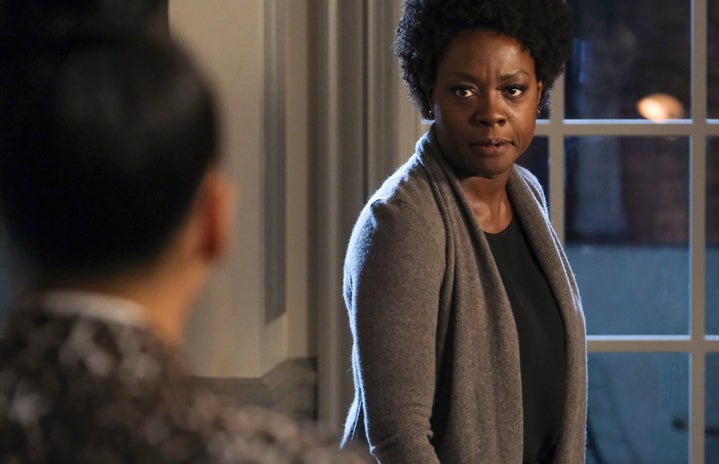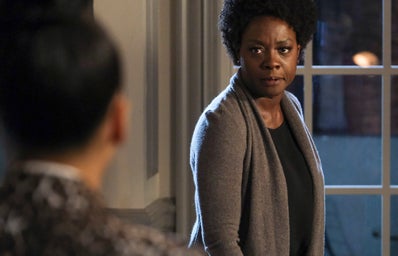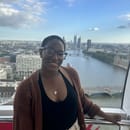“Your existence is an amalgamation of every triumph, every hard-won battle. And yet here you are privileged, blessed, to do what?.”
– Viola Davis, speech given at Barnard’s 127th Commencement, 2019
Viola Davis went through hell and back before becoming one of the most beautiful, fierce, and wholesome women of today. Not many of us knew the details of her past, but with her profound confidence, she shared her life story with us. Davis has granted us the opportunity to see what made her who she is today and see her “vomit,” her “ existential crisis of trying to find meaning.” She is opening up to the world with “this is who the hell I am and I’m tired of filtering it” (The View).
As a child, Davis was hit with various sides of reality: bullying, racism, sexual abuse, domestic family violence and poverty. As a Black woman growing up in a majority White neighborhood, bullying was a constant occurrence for her. In an interview with The View, Davis spoke openly about her experience being chased home from school every single day by a group of boys who threw bricks and yelled racist comments. It was only one of the traumatic events that had occurred in her life; the school bullying was mixed with family problems involving her father’s abuse towards her mother and her constant struggle to survive.
By the time Davis was in her teens, she had been dumpster diving to stay alive. Although her parents had work (her mother was a maid and factory worker, while her father was a horse trainer) basic human necessities still did not come easy. As a young woman, she was defined by many aspects of her life. She felt frightened and powerless, “the only thing I knew how to do was just stand there and be frightened, and to go to school with that trauma, to go to school being hungry, to go to school smelling” (Women in the World).
“I was still very much traumatized by the past. I very much was that little girl running from eight to nine boys who were always calling me ‘you Black ugly n*, you’re ugly, you’re Black, you’re this.’ It’s still very much was internalized in me and it manifested itself through low self-esteem, through bad relationships with not believing in myself.”
Viola Davis, Women in the World, 2018
Shame was a feeling she often felt for a while, “shame for the poverty, shame for the violence, shame for being a bed-wetter, shame for not being perfect” (The View). The list continued carrying on to feeling, “Shame for not being those little characters you read in a book back in the days: see Jane run with Sam with the little dog and the white picket fence”(The View). Her shame was progressing due to the lack of representation she experienced first-hand; her community was not the definition of a community at all. Davis felt like she was spat out and having no mentor to educate her on her worth as a Black person, “what it meant to be dark skinned,” added to her low self-esteem.
To know more of Viola Davis rise into fame and action, read her latest book Finding Me
Despite her struggles, Viola Davis wanted to make something of herself. She had a passion for acting which she discovered while in high school. She fell upon The Autobiography of Miss Jane Pittman seeing for the first time a Black woman, Miss Cicely Tyson, who looked like her, “I saw a physical manifestation of a dream. I saw something that I could put my feet on the floor when I got out of bed in the morning; and I had passion that could drive me, just drive, that’s it” (Women in the World). She went on to be enrolled at Rhode Island College Upward Bound program (federal funded program that provides educational assistance to low-income students) and Young People’s School for Performing Arts in Rhode Island where she earned a summer scholarship from Bernard Masterson (director). She graduated with a Doctorate in Fine Arts before attending the Juilliard School becoming a member of the Drama Division “Group 22.”
Davis’ very first acting role started on the streets of Broadway with William Shakespears’ “As You Like It.” She performed in many Broadway plays thereafter such as Seven Guitars a play written by August Wilson (Davis earned critical praise) and her 2001 performance in another of August Wilson’s play’s, King Hedley II. It was in this performance Davis won a TONY award for Best Featured Actress in a Play and Drama Desk Award.
Davis gained recognition in other mini roles and appearances:
- The Substance of Fire (1996)
- NYPD Blue (1996)
(season four, episode one)
- New York Undercover (1996)
(Season 3, episode 7)
- The Pentagon Wars (1998)
- Out of Sight (1998)
- Antwone Fisher (2022)
(she revealed in a instagram post celebrating its anniversary, was paid $671)
- Doubt (2008)
(Was praised by Chicago Sun-Times critic Roger Elbert for “it is the emotional heart and soul of Doubt”)
Viola Davis ventures on to starring as the main character(s):
- The Help (2011)
- Won’t Back Down (2012)
- Lila and Eve (2015)
- Fences (2016)
- Custody (2016)
- How to Get Away With Murder (2014-20)
- Suicide Squad (2016 and 2021)
- Windows (2018)
- Ma Rainey’s Black Bottom – 2020
- The Woman King (2022)
- The First Lady (2022)
Upcoming movies: The Hunger games: The Ballad of Songbirds and Snakes, Air
Viola Davis, Critics Choice Award, 2012
“You know they say that the two most important days in a person’s life are the day you were born and the day you discover why you were born. I absolutely knew I wanted to be an actor because I wanted to be somebody. I wanted to dream big and make a mark somehow.”
Nominated for and won the 65th Annual Grammy Awards for Best Audio Book, Narration & Storytelling Recording -Spoken Word Album: Finding me
Awards:
- EGOT winner – has won Emmy, Oscar, Grammy, and Tony awards
(First Black performer to wear the “Triple Crown” for acting)
- Academy Award for Best Actress in a Supporting Role
(Fences, Doubt)
- Academy Award for Best Actress in a Leading Role
(Ma Rainey’s Black Bottom, The Help)
- Primetime Emmy Award for Outstanding Lead Actress in a Drama Series
(How to get away with murder. The first Black woman to have won this award)
- Screen Actors Guild Award for Outstanding Performance by a Cast in A Motion Picture
(Ma Rainey’s Black Bottom, Fences, The Help)
- Golden Globe Award for Best Actress — Motion Picture —Drama
(The Woman King, Ma Rainey’s Black Bottom, The Help)
- Primetime Creative Arts Emmy Award for Outstanding Guest Actress in a Drama
(Scandal)
- Tony Award for Best Performance by an Actress in a Featured Role in a Play
(King Hedley II, Seven Guitars)
Honestly, Davis’ experience is one many women of color can resonate with. Davis’ shame for the color of her skin and poverty is one truth I resonate with the most. I grew up with a bucket load of White Barbie dolls: blond hair, blue eyes, petite, with a perfect, white smile (innocently gifted to me by my White foster family). I had Winx club (which by the time they added a Black woman to the show my love for the White characters had already grown), the late 90s Power Rangers, and Disney princesses to occupy my mirror. The memory of standing in the bathroom belonging to my White foster mom is as vivid as the feeling of trying to forget it. The tears, the pain, the “why God wasn’t I born White.” I can recall the memory of the night my mother and little me were starving and had taken a walk around with the intention of begging, luckily we didn’t have to. The nights of living in a shelter as a child not realizing our situation, and in my teen years having made so many decisions that I now know had my mother dying inside.
Davis mentioned remembering her childhood “because she lived it,” I feel this every day. As much as I want try to forget— Davis taught me that I shouldn’t because “Who said that all of who you are has to be good. All of who you are, is who you are.’’ Including “the good and the bad” and “experiences even if they were traumatic” to remember it all and “seize the sword” (Barnard Commencement). So, I will keep trying to own all that I have been through, and work harder than I already have to, as being both Black and a woman in this world.
“And what I find all the time is when I sit at the table and I explain my story of colorism, being darker than a paper bag, growing up in poverty because you can’t talk too much, because it’s not a pretty story, and we got to thrive, we got to be boss. Then if I can’t talk about that then I can’t show up, and if I don’t show up I can’t connect with anyone.”
Viola Davis, The View, 2016
As Viola Davis paves her way in the entertainment industry she, like other actresses of color, is creating a new wave of representation for the current and next generation of colored women. She is helping build an industry where women of color are being shown as more than a token or helpless (Women King, despite its controversies). Davis is bringing to the table that a colored woman is just as worthy of opportunities as a White woman and they deserve them just as much.
Activism:
Viola Davis’ past has helped not only shape her career but her road to being an activist. She is an advocate and supporter of equality for women of color and for human rights.
In 2011, she gave back to her community in Rhode Island by funding the Central Falls Public Library. In 2018, she donated to the Central Falls High School theater program which helped push her acting forward.
Davis has been a collaborator with the Hunger Is campaign (2014), giving grants to organizers that help combat child hunger in America.
In 2016, Davis attended a health center in Central Falls, Rhode Island co-sponsored by The Vaseline Healing Project (partnership) with the goal to provide free health care for those who have been affected by poverty.
Davis attended the 2018 Women’s March, speaking out on the #MeToo movement. She spoke of her own experience and of those who have no voice.
As of 2020, she has become a national spokesperson for No Kid Hungry.
Want to combat hunger alongside Viola Davis, check out: RiseFirst and No Kid Hungry
To know more of Viola Davis rise into fame and action, read her latest book Finding Me:
amazon, Apple Books , kobo, Barnes & noble, google play, scribed , audible
Click here for more conversations with Viola Davis:
- Brut America – Viola Davis reflects on being a Black woman in Hollywood
- Women in the World – The Might voice of Viola Davis
- Television Academy – Viola Davis gives powerful speech about diversity and opportunity
- The Ellen Show – Viola Davis talks about Hunger Is
- Entertainment Tonight – Viola Davis on surviving a hungry, impoverished childhood
References:
Barnard College. (2019, May 21). Viola Davis: Barnard Commencement 2019 [Video]. YouTube.
Brown, G. (2014, December 16). Exclusive interview: Viola Davis talks about her life and her new
film.Rhode Island College. https://www.ric.edu/news-events/news/exclusive-interview-viola-davis-talks-about-her-life-and-her-new-film
CNN. (2018, January 20). Viola Davis speaks at Women’s March [Video]. YouTube.
Lee, L. (2019, February 26). Viola Davis takes on poverty in hometown. CNN.
https://edition.cnn.com/2016/10/27/entertainment/iyw-viola-davis-healing-project/index.html
Lambe, S. (2017, October 5). Viola Davis partners with Hunger Is Foundation to deliver 30 grants in
30 days (exclusive). Entertainment Tonight.
https://www.etonline.com/viola-davis-partners-hunger-foundation-deliver-30-grants-30-days-excl
Life Stories by Goalcast. (2021, March 18). Viola Davis reveals details of her tragic childhood
[Video]. YouTube. https://youtu.be/5QWsfnp2LaU
The View. (2022, April 26). Viola Davis opens up shame she felt surrounding childhood, poverty,
violence, bullying [Video]. YouTube. https://youtu.be/vEFMlXrWb9I
Viola Davis. (2023). In Wikipedia.
https://en.m.wikipedia.org/wiki/Viola_Davis#Philanthropy_and_activism
Women in the World. (2018, February 15). Viola Davis’ full interview with Tina Brown at
the Women in the World Los Angeles Salon [Video]. YouTube.
Wurzburger, A. (2022, August 11). Viola Davis’ Most Game-Changing Roles on Film, TV and Stage.
People. https://people.com/movies/viola-davis-most-memorable-roles-tv-film-stage/


